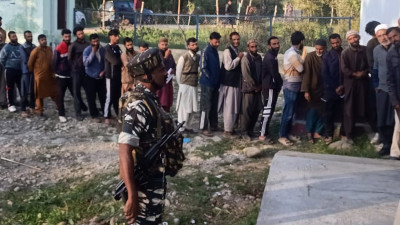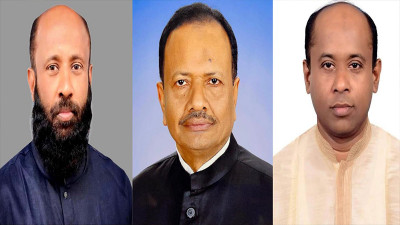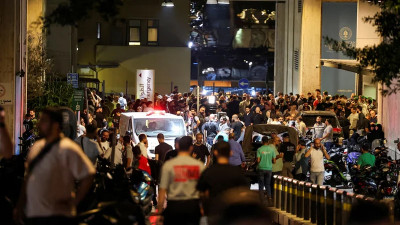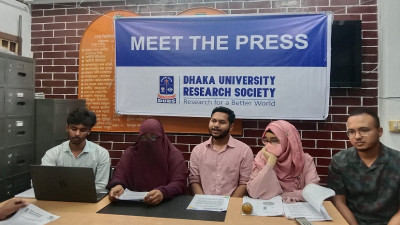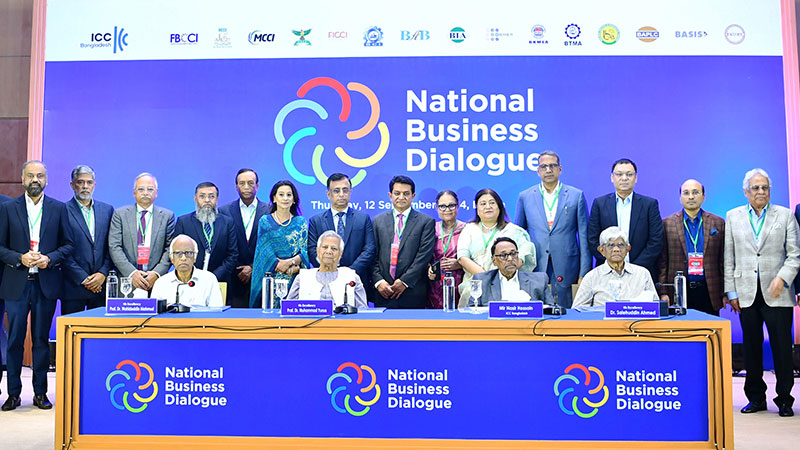 Chief Adviser Dr. Muhammad Yunus met with business leaders yesterday (Thursday, September 12) at a hotel in Dhaka. Photo: PID
Chief Adviser Dr. Muhammad Yunus met with business leaders yesterday (Thursday, September 12) at a hotel in Dhaka. Photo: PID The
Chief Adviser of the interim government, Professor Muhammad Yunus, said, “The
decay that had taken root in Bangladesh could only be overcome through the
student and public uprising. The students’ movement abruptly changed that
situation. No more decay, we want to stand as a healthy and strong nation.”
Professor
Yunus made these remarks yesterday (Thursday, September 12) as the chief guest
at the ‘National Business Dialogue’ held at a hotel in the capital. The event
was organized by the International Chamber of Commerce, Bangladesh (ICCB), with
15 co-hosting organizations, including FBCCI, DCCI, MCCI, CCCCI, FICCI, BCI,
BAB, BIA, BGMEA, BKMEA, BTMA, BAPI, BAPLC, BASIS, and LFMEAB. Other speakers
included Adviser for Education and Planning Wahiduddin Mahmud and Adviser for
Finance and Commerce Dr. Salehuddin Ahmed. In the absence of ICCB President
Mahbubur Rahman, businessman Mir Nasir Hossain spoke on behalf of the business
community.
Addressing
the business leaders, Dr. Yunus said, “The fact that we are capable of great things
is proven by our businessmen. With tremendous courage, you have become
entrepreneurs. Becoming an industrialist was once a distant dream for
Bangladeshis, but you made it happen. You are world-class entrepreneurs. By
seizing the opportunities that the youth have brought, you can build the new
Bangladesh of your dreams.”
The
Chief Adviser further stated, “This is not a fantasy. I firmly believe that if
you are determined to move forward, we can build a new Bangladesh at a rapid
pace.”
Urging
the business community to initiate social businesses, the Chief Adviser said,
“Establish social businesses in your village, upazila, or the area around your
business. Social enterprises can be developed for clean water, healthcare,
education, and environmental improvements. You will invest not for profit but to
support and benefit others.”
On
behalf of the business community, Mir Nasir Hossain raised several specific
issues aimed at creating a business-friendly environment and called for the
Chief Adviser’s intervention. He said, “Since the time of the student and
public uprising, there has been a significant void in the presence of law
enforcement in the country. This lead to a deterioration in law and order. The
limited presence of industrial police and the lack of full-scale operation of
local police forces have made it impossible to control the situation. As a
result, our economic capacity is being severely impacted, which will directly
reduce employment opportunities. We urgently request the continuous presence of
joint forces in all industrial areas.”
Mir
Nasir also emphasized the need for reforms in the insurance industry and the
stability of the financial sector. On the topic of energy, he said, “There is
no alternative to ensuring an uninterrupted supply of gas and electricity to
maintain production and services across all industries. If we ensure the
necessary energy imports, the economy will remain active. We are urging the
government to prioritize renewable energy, including solar power, over coal,
gas, and oil-based power plants. Additionally, we request urgent steps to be
taken to extract our own gas and coal.”
Mir
Nasir added, “A cunning, conspiratorial faction is relentlessly trying to
destabilize society and the economy in order to corner the interim government.
This malicious group must be stopped. The business community has full
confidence in the ‘new Bangladesh’ that has emerged from the student-led mass movement
and in the government led by Professor Muhammad Yunus.”
Wahiduddin
Mahmud said, “In global evaluations, many of our industrial enterprises have
secured top positions. This means that if we are truly enterprising and
dedicated, we can succeed, as you have demonstrated. However, we see a
significant disparity in quality among industrial enterprises, which our
research has confirmed.”
He
added, “After our graduation from LDC status, we will face much more
competition in the global market. We are already facing increased competition.
There will be many regional and bilateral trade agreements, and we must
participate in those. Entrepreneurs who are lagging must step up, or they will
be left behind—that is the reality.”
He
further stated, “When we enter into bilateral or multilateral agreements, we
will need to increase our productivity, enhance the skills of our workers, and
focus on technological advancements. We cannot move to the next stage of
industrialization by relying on low wages, low-skilled, or unskilled workers
for remittances.”
Wahiduddin
Mahmud added, “Some business leaders and industrialists have become
billionaires overnight through corruption, with support from the previous
government. They have tarnished the country’s reputation. We are not overly
eager to see more names added to the list of billionaires on the global
economic map. Moreover, there’s no pride in creating billionaires by
misinterpreting the free market economy. What we prefer is the way you grew as
entrepreneurs, starting small and gradually expanding.”
Salehuddin
Ahmed, the Adviser for Finance and Commerce, added, “We are currently facing
many challenges, which have developed over the last 15-16 years. These are
essentially legacy problems, and it will take time to resolve them. However, we
won’t take too long, we will fix the major issues in a short period. The
economic engine had slowed down, but we are working to move it forward.”
He
further explained, “The previous government did things that went against sound
policy, and we are trying to correct those mistakes. My point is, why should
everyone rely on banks for financing? No country has a banking-dependent
financial industry.”
He
continued, “Businesses have raised many concerns, and there are still more
issues. We are working to address them all. Our main focus is business,
commerce, and employment.”
Addressing
the business community, Salehuddin Ahmed said, “We’re not saying you can’t make
profits, but you cannot aim for abnormal profits. We are also keeping an eye on
inflation. Why should we pay BDT 100 for an eggplant that used to cost BDT 10?
There are powerful connections at play in these areas.”
Chief
Adviser Professor Muhammad Yunus said, “For however long we are in charge of
the government, we want to work together. We want to leave behind a legacy, to
say that this country gave us a chance, and we made the most of it.”
Speaking
about the student-people protests, Yunus said, “This was no ordinary movement.
Many of those who were martyred said their final goodbyes before leaving their
homes. They were determined to fulfill the purpose for which they took to the
streets, even if it cost them their lives.”
Yunus
urged, “Don’t leave reform solely to the government. Let’s all reform together.
Whenever you see a mistake, reflect on it, and find a way out. Look at the
young people who sacrificed themselves, and avoid straying down the wrong
path.”
He
added, “During our tenure, we aim to foster harmonious labor-owner relations.
We have yet to join the Geneva Convention. Give us the courage, step forward,
and together we will sign the ILO Convention.”
Yunus
called on business leaders to ensure workers receive what they deserve and
urged cooperation from owners. Highlighting Bangladesh’s second-place position
in garment exports, he challenged the business community to strive for the top
spot.
Yunus
acknowledged the many barriers to doing business in Bangladesh. “The obstacles
to business are endless. Running a business is a monumental struggle. But we
will overcome these hurdles together, working as members of one family.”


